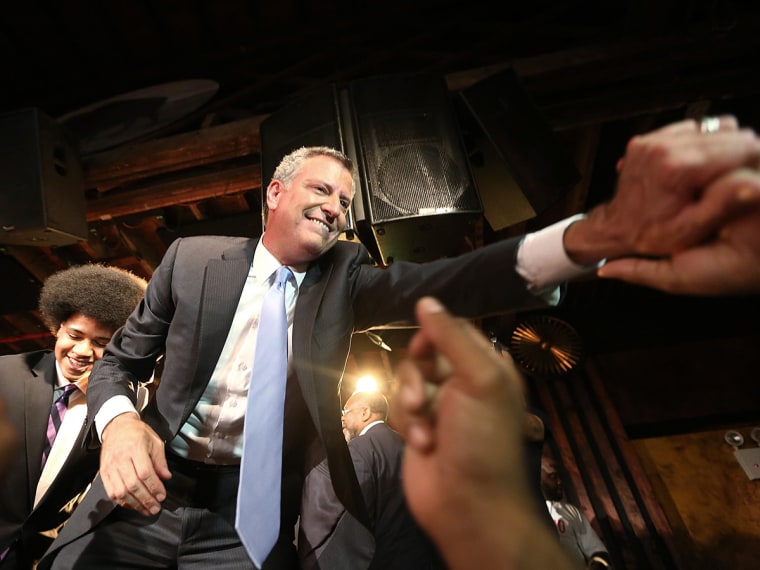Bill de Blasio, who ran as the anti-Bloomberg candidate, won the majority of Democratic votes in New York's mayoral primary Tuesday in a crowded race marked by big personalities for the country's largest city.
Whether he has managed to avoid a run-off with the second-place Bill Thompson was still unknown in the early hours of Wednesday, but with 98% of precincts reporting, he was at 40.2%. To avoid a run-off competition with Thompson in a few weeks time, de Blasio must capture 40% of the primary vote, according to New York election laws, but a number of paper ballots were still be counted.
Christine Quinn, the one-time frontrunner and City Council speaker, had placed a distant third, according to exit poll results.
De Blasio, 52, the city's public advocate who gained both attention and votes from liberal voters, had only recently surged in the polls after running behind other frontrunners for much of the campaign and slowly picking off competitors leading into the primary. De Blasio beat out a long list of Democratic primary candidates in the mayor's race including Sal Albanese, Randy Credico, Neal Grimaldi, John Liu, Christine Quinn, Erick Salgado, Bill Thompson and (of course) Anthony Weiner.
De Blasio ran on the theme of addressing income inequality which has surged in New York City, as elsewhere around the country. He also strongly opposed Mayor Michael Bloomberg administration policies like the New York Police Department's stop-and-frisk methods, promising to end racial profiling and to replace Police Commissioner Ray Kelly, who has staunchly defended the police department's tactics.
The candidate, whose progressive message resonated with Democrats--who outnumber Republicans six to one in New York City--could give the city a Democratic mayor next year for the first time since 1993. Former Mayor David Dinkins, elected in 1989, was the last Democrat elected as mayor.
De Blasio argued that he was the candidate who could provide the cleanest break from 12 years of Mayor Bloomberg. Calling to attention the growing class divide, de Blasio positioned himself as a defender of middle-class New Yorkers. De Blasio has proposed a tax on the wealthy. Bloomberg said de Blasio was waging a "class warfare and racist" campaign, according to an interview with New York Magazine.
De Blasio's son, Dante, who was featured in a widely-discussed television ad that showcased his interracial family. The candidate's son, who has received wide attention across town, knocked Mayor Bloomberg's record. "He's the only Democrat with the guts to really break from the Bloomberg years, the only one who will raise taxes on the rich to fund early childhood and after-school programs. He's got the boldest plan to build affordable housing. And he's the only one who will end a stop-and-frisk era that unfairly targets people of color," Dante says in the ad. "Bill de Blasio will be a mayor for every New Yorker, no matter what they live and what they look like."
Weiner conceded before final results were announced Tuesday night. "We had the best ideas," Weiner said. "Sadly, I was an imperfect messenger."
The former congressman's campaign never recovered from the disclosure that he had continued having inappropriate online relationships even after he quit Congress. In an unforgettable press conference with his wife, Huma Abedin by his side, Weiner said his behavior and personal drama were behind him.
But his campaign turned combative and defensive, and the former frontrunner fell in the polls. He got into altercations with New York City voters and had a stinging interview with MSNBC host Lawrence O'Donnell the eve of the primary election.
Abedin supported her boss, former Secretary of State Hillary Clinton, at an important fundraiser on Monday, the day before the primary and did not accompany the candidate to the voting booth where Weiner cast his vote while holding their son.
The city's other famous sex-scandal survivor, former Governor Eliot Spitzer, lost his bid to be city comptroller. Manhattan Borough President Scott Stringer beat Spitzer, 52% to 48%.
City Republicans selected Joe Lhota, a former public transit chairman favored by former Mayor Rudy Giuliani, for their nominee. Lhota beat the other leading contender for the Republican mayoral nomination, John Catsimatidis, billionaire owner of grocery store chain Gristedes.
"This election is not about Democrats or Republicans, it has to do with who can lead well, who can manage the budget, and city employees, who can be independent, who can stand up, who will stand up to the special interest," Lhota said Tuesday evening in his victory speech. "My leadership is tested in good times and bad and New Yorkers know what they will get from me."
According to the NBC 4 New York/Wall Street Journal/Marist Poll released Sunday, more blacks backed de Blasio than Bill Thompson, the race's only black candidate, by 39% to 25%. And more women support de Blasio than Christine Quinn, the race's only female candidate, by 34% to 21%. City Council Speaker Christine Quinn, once the clear front-runner, would have been the city's first openly gay and female mayor.
The New York City Board of Elections voted this past summer to use lever voting machines for the primary election and the runoff, but these decades-old voting machines caused problems for voters including one leading mayoral candidate: Lhota. Lhota, along with other voters, was asked to submit his ballot with a paper and pen, when the 60's-era lever machines malfunctioned.
New York City's general election will take place Nov. 5.
